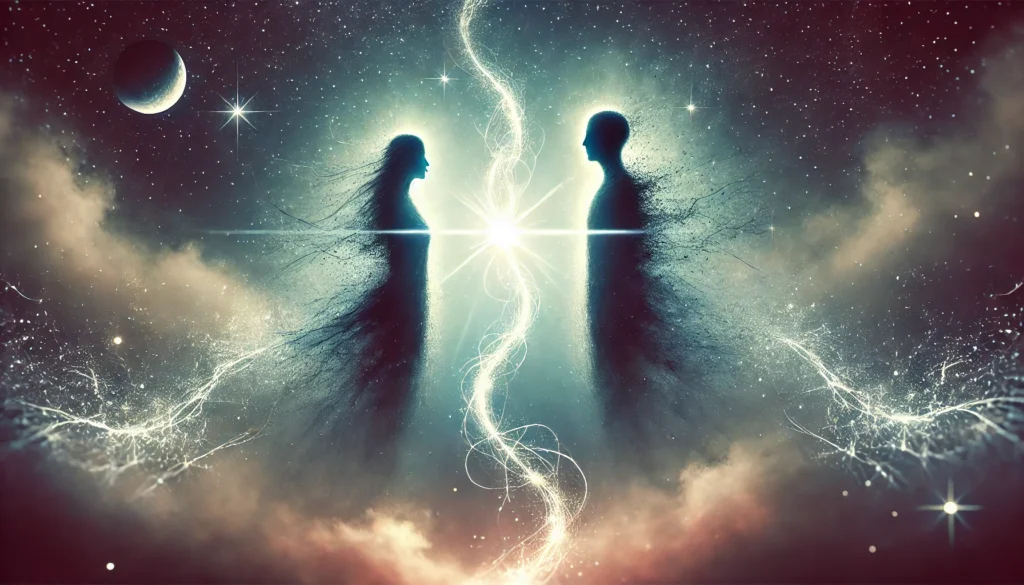
The idea of soulmates has intrigued humanity for centuries. Across various cultures and ancient beliefs, the notion of finding a destined partner—someone who completes your soul—has been a source of hope and fascination. But do soulmates really exist? Let’s take a journey through ancient beliefs and modern perspectives to explore this timeless question.
The Origin of the Soulmate Concept
The concept of soulmates can be traced back to ancient philosophies and religious beliefs. One of the earliest references comes from Greek mythology. Plato, in his work Symposium, describes a story where humans originally had four arms, four legs, and a single head with two faces. Fearing their power, Zeus split them in two, condemning them to spend their lives searching for their other half—their soulmate.
Similarly, in Hindu philosophy, the idea of twin flames resonates with the soulmate concept. It suggests that souls are split and reincarnated over lifetimes to eventually reunite. This belief ties into the karmic connection between two souls destined to be together.
Ancient Chinese Beliefs
In Chinese culture, the “red thread of fate” is a popular metaphor. According to this legend, an invisible red thread connects those who are destined to meet, regardless of time, place, or circumstances. This thread may stretch or tangle but will never break, symbolizing an unbreakable bond.
Soulmates in Western Traditions
In Christianity, the idea of soulmates often aligns with the belief that God has a divine plan for everyone, including a life partner. Many interpret this as the existence of a soulmate chosen by God. Similarly, in Judaism, the term “Bashert” refers to one’s destined partner, emphasizing that marriages are made in heaven.
The Modern Perspective on Soulmates
Today, the concept of soulmates has evolved beyond religious and cultural boundaries. It’s often seen as a deep emotional and spiritual connection rather than a preordained destiny. Modern psychology suggests that people find their “soulmates” through shared values, mutual respect, and personal growth.
However, the idea of soulmates still holds a special place in many hearts, inspiring people to believe in true love and destiny.
Do Soulmates Really Exist?
While science hasn’t proven the existence of soulmates, many people report feeling an unexplainable connection with certain individuals. This connection often transcends physical attraction, aligning more with shared energy, mutual understanding, and an intuitive bond.
Signs You’ve Found Your Soulmate
- Instant Connection: You feel an immediate and strong bond.
- Deep Understanding: They understand you in ways others don’t.
- Shared Growth: You inspire each other to be better.
- Intuitive Trust: There’s an unshakable sense of trust and safety.
Related Post: 10 Proven Signs You’ve Found Your Soulmate
Balancing Science and Spirituality
Believing in soulmates doesn’t mean ignoring reality. Relationships require effort, communication, and mutual respect. The idea of soulmates can serve as a guiding principle, but lasting love depends on the choices and actions of both individuals.
Final Thoughts: Do Soulmates Really Exist?
The answer to whether soulmates exist depends on your beliefs and experiences. Ancient cultures and modern perspectives both offer compelling arguments for the existence of destined connections. Whether you find the concept in myth, religion, or personal relationships, the idea of soulmates continues to inspire hope and love.
Ultimately, the journey to find your soulmate is as meaningful as the destination. Embrace the idea of soulmates not just as a romantic notion but as an opportunity to seek deep and fulfilling connections with others.
Related Post: How to Find Your Soulmate in 2025: Trends and Tips
What Are Soulmates?
At its core, a soulmate is someone with whom you share a deep, intense connection that transcends the physical realm. Soulmates are believed to be two halves of one soul who have been destined to meet and reunite in this lifetime. These connections are often characterized by an inexplicable bond that feels both familiar and destined.
While many people use the term “soulmate” to refer to their romantic partner, it is not always limited to love relationships. Some believe that soulmates can be friends, family members, or even mentors—individuals who play a significant role in your life’s journey and spiritual growth.
The Ancient Greek Origins of Soulmate Beliefs
One of the earliest mentions of soulmates comes from the writings of the ancient Greeks. The philosopher Plato, in his work The Symposium, wrote about a myth in which humans originally had four arms, four legs, and a single head with two faces. According to the myth, humans were originally round beings who were so powerful that they challenged the gods. In response, the gods split them in half, leaving each person to search for their other half—what we now call a “soulmate.”
This idea was further developed by the philosopher Aristophanes, who argued that people are always searching for their perfect counterpart. This mythological view laid the foundation for the idea that soulmates are individuals who are destined to complete us, offering a sense of wholeness and fulfillment.
The Role of Soulmates in Eastern Philosophy
In Eastern philosophies such as Hinduism and Buddhism, the concept of soulmates is intertwined with the idea of reincarnation. According to these beliefs, souls are reincarnated over many lifetimes, and they often cross paths with other souls they have known in past lives. These connections are said to be meaningful and serve as part of the soul’s spiritual evolution.
In Hinduism, the concept of “atman” (the soul) is central. The belief is that the soul is eternal, and when two souls are deeply connected, it is because they have shared karmic ties from previous lives. Meeting your soulmate, in this sense, is a continuation of your spiritual journey and growth.
Buddhism also views soulmates in terms of karmic relationships. The belief is that every individual we meet serves a purpose, whether it’s to help us grow, teach us lessons, or even heal past wounds. Soulmate connections are considered sacred, as they help us transcend past suffering and reach a state of enlightenment.
The Role of Soulmates in Modern Spirituality
In modern times, many people continue to believe in the idea of soulmates, although the interpretation has evolved. New age spirituality often emphasizes the notion of “twin flames,” which are believed to be two souls that were once one but split into two separate beings. Twin flames are thought to be mirrors of one another—reflecting each other’s strengths, weaknesses, and desires. Meeting a twin flame is said to trigger profound personal transformation.
Spiritual teachers and psychics often claim that soulmates and twin flames are part of a divine plan and that the universe conspires to bring these individuals together. This concept of destiny is still popular in modern spiritual practices, including astrology, numerology, and even psychic readings.
The Science of Soulmates
While many people believe in the existence of soulmates, science takes a different approach to love and relationships. Psychologists suggest that the idea of a soulmate can be explained by a combination of psychological factors, including attachment theory and the need for companionship.
According to attachment theory, humans are biologically wired to seek close emotional connections with others, especially in romantic relationships. This may explain why we often feel “fated” to meet someone who feels like “the one.” In reality, people tend to form bonds based on shared experiences, values, and emotional compatibility, which may contribute to the feeling of meeting a soulmate.
Moreover, neuroscientific studies show that when people fall in love, certain regions of the brain are activated, including those responsible for pleasure, reward, and emotional attachment. The intense emotions that come with love can mimic the feeling of destiny or fate, making it seem like we are meeting the person we were always meant to be with.
The Soulmate Connection in Today’s World
Despite the scientific perspective, many people still hold onto the belief in soulmates. The idea offers hope and inspiration in the search for love. Soulmate connections are often described as the ultimate form of romantic fulfillment, where two people come together in perfect harmony, understanding, and support.
However, it’s important to remember that the concept of soulmates does not mean that relationships are without their challenges. Even soulmates must work on building a healthy relationship based on mutual respect, communication, and trust.
In today’s fast-paced world, people are often looking for their soulmate through online dating, astrology, and even psychic readings. The idea that there’s someone out there who is destined for them gives many hope, especially when it comes to matters of love and relationships.
One service that has garnered attention in recent years is Soulmate Sketch, a service where psychics and spiritual experts offer detailed sketches of your soulmate, claiming to help individuals visualize and manifest their connection with their ideal partner. While experiences may vary, the concept aligns with the belief that your soulmate is somewhere out there, waiting for you.
Conclusion: Do Soulmates Really Exist?
Whether soulmates exist or not is still a matter of personal belief. While science may argue that romantic bonds are based on psychological and emotional connections, many still find comfort in the idea of meeting someone who is uniquely and profoundly connected to their soul. From ancient Greek philosophy to modern spiritual teachings, the concept of soulmates has endured, evolving in meaning and significance.
The belief that love is written in the stars or that our souls are destined to meet can inspire us to seek meaningful connections and cherish the relationships we form. Ultimately, the search for a soulmate may be less about finding someone who is “perfect” and more about discovering a bond that feels destined, meaningful, and transformative.


